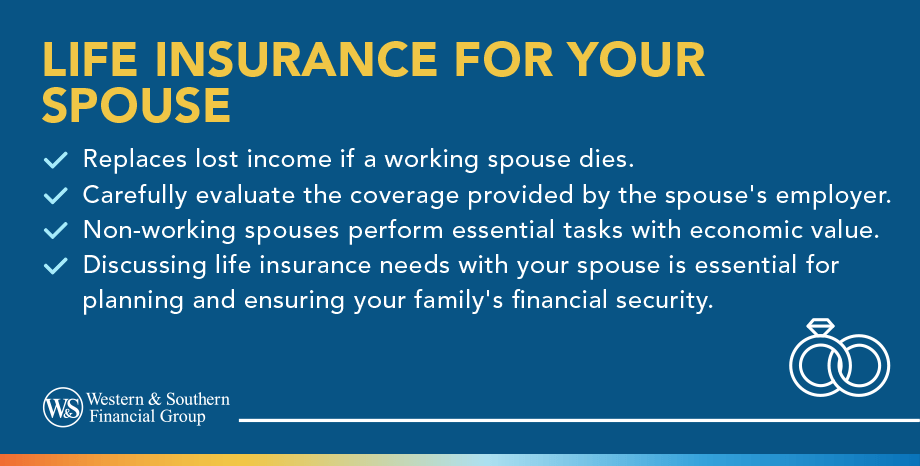Video Transcript
Today, we're diving into an important aspect of retirement planning: life insurance for your spouse. Whether you're newlyweds, celebrating decades together, or anywhere in between, understanding how to properly insure your partner can be important when securing your financial future together.
Why consider life insurance for your spouse? Here are a few compelling reasons: Income Replacement. These are funds needed replace your spouse's income which could be vital in maintaining your standard of living, especially if you have children, debts, or other monthly expenses.
Debt Coverage: To cover debts such as credit cards, loans, or a mortgage that might otherwise strain the surviving spouse.
Funeral: To cover funeral and final expenses, relieving financial stress during a difficult time.
What are your future obligations down the road. Think about future needs like your children's education costs or retirement savings and how you may cover those expenses. When it comes to choosing the type of life insurance for your spouse, there are two main types to consider.
Term life insurance provides coverage for a specific period, such as 10, 20, or 30 years. If you pass away during this time, your policy pays out a death benefit to your beneficiaries as long as the policy is active and premiums are paid. It's generally more affordable and may be sufficient if you only need coverage until major debts are paid off or until children are financially independent.
Permanent life insurance includes whole life and universal life policies that offer lifelong coverage as long as premiums are paid and may build up cash value over time. This type of insurance is generally more expensive.
Determining how much life insurance to buy for your spouse involves several factors. Income replacement. Consider your spouse's annual income and the length of time you would need to replace this income. Future Financial Goals. Think about costs your children's higher education, future investments, or retirement savings. Current Financial Resources. Take into account any other assets, savings, or life insurance policies already in place. A general rule of thumb is to have a policy that is 10 to 12 times the annual income, but this can vary based on your specific circumstances.
Choosing the right policy for your spouse means comparing different options. Here are a few tips: Read the Fine Print. Understand the inclusions, exclusions, and terms of the policy. Consider Riders. Look into additional benefits like critical illness riders or premium waivers that might be beneficial. And lastly Professional Advice. Consult with an insurance professional who can provide clarity and help tailor a policy to your specific needs.
Thank you for watching our guide on understanding life insurance for your spouse. Taking the time to ensure your spouse is properly insured is a vital step in helping protect your family's financial future.
Key Takeaways
- Life insurance for your spouse helps protect your family’s financial security by replacing lost income and covering expenses after a death.
- Both working and non-working spouses provide financial value, and losing either can create major household and childcare costs.
- Reviewing policy types - term, whole, universal, and joint life - can help you choose coverage that fits your family’s long-term needs and budget.
- Evaluating features like convertibility, waiver of premium, and accelerated death benefits ensures the policy adapts to life’s changes.
- Working with a trusted financial professional can help you determine the right amount of coverage and the best plan for your family’s goals.
Few conversations are harder than those about death, especially when it involves your spouse. Yet planning for the unthinkable may be one of the most loving things you can do. Life insurance for your spouse can help make sure that, even in the worst-case scenario, your family’s future stays secure.
Whether your partner works full-time, part-time, or stays at home to manage the household, their contribution carries significant financial value. The right life insurance policy can help replace lost income, cover funeral expenses, and provide stability when it’s needed most.
Why Life Insurance for Your Spouse Matters
You may already have life insurance for yourself, but what about your spouse? In most households, both partners contribute in different ways. If the unexpected happens, the loss of either could create lasting financial challenges.
You may be all set up to help your family in case the worst happens, but your spouse’s death could still dramatically impact how you and your loved ones fare in the (hopefully very unlikely) event of an early death.
Common Financial Challenges Families Face After the Death of a Spouse
- Loss of income or household support
- Outstanding debts such as mortgages, loans, or credit cards
- Medical bills and final expenses
- Childcare and household management costs
- Long-term financial goals like retirement savings or education funding
Life insurance can help fill these gaps by providing a death benefit - a tax-free payout that can be used for immediate or long-term needs. Life insurance death benefits are generally paid income tax-free under current federal tax law. Consult your tax advisor.1,2


Life Insurance Coverage for Working Spouses
If your spouse dies during their working years, life insurance can be critical for income replacement. Even if they work part-time, every bit of income helps support the family budget.
The stakes are even higher if you have children. Losing an income earner can strain your family’s finances - leaving you to raise kids, maintain the household, and plan for the future on one income. But life insurance coverage could help fill in those financial gaps, including final expenses and unpaid bills.
If your spouse has employer-provided life insurance, evaluate that coverage carefully:
- Most group life insurance policies only provide one or two times annual salary as a benefit amount.3
- This may not be enough to replace income or cover ongoing expenses.
- Employer coverage often ends when your spouse changes jobs or retires.
You might consider purchasing an individual life insurance policy that offers customizable coverage amounts, flexible premium payments, and the ability to maintain protection regardless of your spouse’s employment situation.
Life Insurance Coverage for Non-Working Spouses
A stay-at-home spouse contributes immense value to your household. While their work may not come with a paycheck, replacing their efforts can be expensive.
Consider everything they do:
- Childcare and transportation
- Cooking and meal planning
- Cleaning, shopping, and scheduling
- Managing household finances or home projects
If that spouse were to die unexpectedly, you might not lose direct income, but you could face new costs for childcare, cleaning services, or home management help. These expenses add up quickly and can affect your ability to work full-time or maintain your standard of living.
That’s why life insurance protection for a non-working spouse is just as important as for one who earns an income.
Comparing Life Insurance Policy Types for Your Spouse
Here’s a quick comparison of life insurance options to help you decide what fits your household’s needs:
| Type of Policy | Description | Pros | Cons |
|---|---|---|---|
| Term Life Insurance | Provides coverage for a set period | Affordable, simple, ideal for temporary needs | Expires at term end; no cash value |
| Whole Life Insurance | A type of permanent life insurance that covers your spouse for life | Guaranteed death benefit and level premium rate | Higher cost than term life |
| Universal Life Insurance | Adjustable permanent life insurance offers flexibility with premiums and coverage | Adjustable benefits and potential for cash value growth | Complex structure; returns depend on interest rates |
| Joint Life Insurance (First-to-Die) | Covers both spouses, paying the death benefit after the first death | Ideal for couples who want to protect each other’s income | Coverage ends after one spouse dies |
| Survivorship Life Insurance (Second-to-Die) | Pays the benefit amount after both spouses pass away | Useful for estate planning and leaving an inheritance | Doesn’t help the surviving spouse financially |
| Group Insurance | Coverage offered by employers or organizations | Often inexpensive and easy to enroll | May not be portable or provide enough coverage |
How Much Life Insurance Does Your Spouse Need?
After you decide whether you need additional coverage, the next question is how much life insurance is appropriate.
Start by reviewing your family’s financial picture:
- Assess your current expenses: Include housing, groceries, childcare, transportation, and healthcare.
- Add future costs: College tuition, mortgage payments, and potential medical bills.
- Factor in final costs: Funeral and burial expenses, typically ranging from $7,000–$10,000.
- Subtract assets: Include savings, investments, and existing life insurance coverage.
You can use these estimates to calculate a realistic coverage amount that provides enough support for your family if your spouse dies unexpectedly.
Calculator
Use our life insurance calculator to help estimate how much coverage your spouse may need to help protect your family’s financial future.
Key Features to Consider in a Spouse Life Insurance Policy
When comparing Spouse Life Insurance options, look for policies that offer flexibility and value. Consider the following features:
- Accelerated Death Benefit: Allows early access to part of the death benefit if your spouse becomes terminally ill. Payment of Accelerated Death Benefits if not repaid will reduce the Death Benefit and may affect other policy values. Receipt may affect eligibility for government benefits and could be taxable. Consult your tax advisor.
- Child Rider: Add-on coverage for children that can provide additional protection for your family.
- Convertible Options: Convert a term life insurance policy to permanent coverage later without a new medical exam.
- Waiver of Premium: Temporarily suspends premium payments if your spouse becomes disabled.
Each of these features can make a significant difference in how well your insurance plan adapts to life’s changes.
How to Choose the Right Insurance Plan
When selecting life insurance for your spouse, consider both emotional and practical factors:
- Affordability: Choose a premium payment schedule that fits your budget.
- Stability: Evaluate the insurance company’s financial strength through agencies like AM Best or Standard & Poor’s.
- Customizability: Make sure the insurance policy allows you to adjust coverage as your family grows.
- Portability: If your spouse changes jobs, confirm you can maintain coverage independent of employer-based plans.
You can also work with a financial advisor or insurance representative to help compare individual life insurance options, determine appropriate coverage levels, and align protection with long-term goals.
The Bottom Line
Discussing mortality can be uncomfortable, but doing so together strengthens your financial foundation. By purchasing life insurance for your spouse, you’re not only buying protection; you’re helping prepare your family for the future.
It’s one of the clearest demonstrations of care and foresight you can give to your partner and your family.
Life insurance can help ensure your family's future financial security. Request a Free Life Insurance Quote
Frequently Asked Questions
Who qualifies as a spouse or domestic partner for life insurance purposes?
Should both spouses have life insurance, or is one policy enough?
Can you buy a life insurance policy on your spouse without their knowledge?
When should married couples review or update their life insurance?
Who should be listed as the beneficiary: the spouse, children, or a trust?
What happens to a spouse’s policy in a divorce or separation?
Sources
- Do Beneficiaries Pay Taxes on Life Insurance? - SmartAsset. https://smartasset.com/insurance/do-beneficiaries-pay-taxes-on-life-insurance.
- Are the Life Insurance Proceeds I Received Taxable? - IRS. https://www.irs.gov/help/ita/are-the-life-insurance-proceeds-i-received-taxable.
- 2024 Employer Guide to Life Insurance – Guardian Life Insurance of America. https://www.guardianlife.com/life-insurance/employer-guide.

































